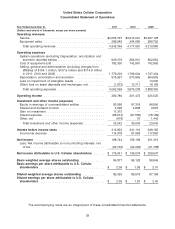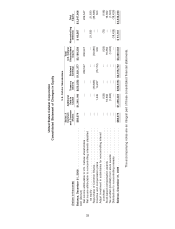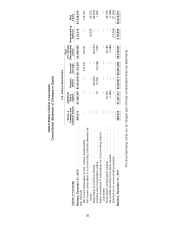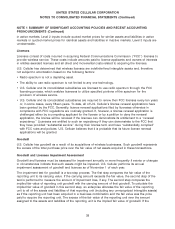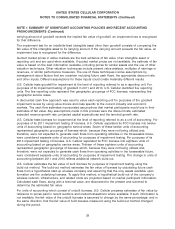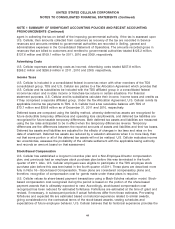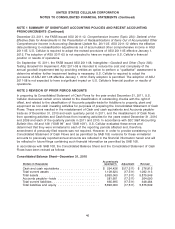US Cellular 2011 Annual Report Download - page 44
Download and view the complete annual report
Please find page 44 of the 2011 US Cellular annual report below. You can navigate through the pages in the report by either clicking on the pages listed below, or by using the keyword search tool below to find specific information within the annual report.UNITED STATES CELLULAR CORPORATION
NOTES TO CONSOLIDATED FINANCIAL STATEMENTS
NOTE 1 SUMMARY OF SIGNIFICANT ACCOUNTING POLICIES AND RECENT ACCOUNTING
PRONOUNCEMENTS
United States Cellular Corporation (‘‘U.S. Cellular’’), a Delaware Corporation, is an 84%-owned subsidiary
of Telephone and Data Systems, Inc. (‘‘TDS’’).
Nature of Operations
U.S. Cellular owns, operates and invests in wireless systems throughout the United States. As of
December 31, 2011, U.S. Cellular served 5.9 million customers. U.S. Cellular operates as one reportable
segment.
Principles of Consolidation
The accounting policies of U.S. Cellular conform to accounting principles generally accepted in the
United States of America (‘‘GAAP’’) as set forth in the Financial Accounting Standards Board (‘‘FASB’’)
Accounting Standards Codification (‘‘ASC’’). Unless otherwise specified, references to accounting
provisions and GAAP in these notes refer to the requirements of the FASB ASC. The consolidated
financial statements include the accounts of U.S. Cellular, its majority-owned subsidiaries, general
partnerships in which U.S. Cellular has a majority partnership interest and variable interest entities
(‘‘VIEs’’) in which U.S. Cellular is the primary beneficiary. Both VIE and primary beneficiary represent
terms defined by GAAP. Prior to January 1, 2010, the primary beneficiary of a VIE was the entity that
recognized a majority of a VIE’s expected gains or losses, as determined based on a quantitative model.
Effective January 1, 2010, new provisions under GAAP related to accounting for VIEs provide for a more
qualitative assessment in determining the primary beneficiary of a VIE. The revised consolidation
guidance related to VIEs effective January 1, 2010 did not change U.S. Cellular’s consolidated reporting
entities. The Consolidated Statement of Comprehensive Income was not included because
comprehensive income for the years ended December 31, 2011, 2010 and 2009 equaled net income.
All material intercompany accounts and transactions have been eliminated.
Reclassifications
Certain prior year amounts have been reclassified to conform to the 2011 financial statement
presentation. These reclassifications did not affect consolidated net income attributable to U.S. Cellular
shareholders, cash flows, assets, liabilities or equity for the years presented.
Business Combinations
U.S. Cellular accounts for business combinations at fair value in accordance with the acquisition method.
This method requires that the acquirer recognize 100% of the acquiree’s assets and liabilities at their fair
values on the acquisition date for all acquisitions, whether full or partial. In addition, transaction costs
related to acquisitions are expensed.
Use of Estimates
The preparation of consolidated financial statements in conformity with GAAP requires management to
make estimates and assumptions that affect (a) the reported amounts of assets and liabilities and
disclosure of contingent assets and liabilities at the date of the financial statements and (b) the reported
amounts of revenues and expenses during the reported period. Actual results could differ from those
estimates. Significant estimates are involved in accounting for Goodwill and indefinite-lived intangible
assets, Depreciation, amortization and accretion, allowance for doubtful accounts, loyalty reward points,
and income taxes.
36





